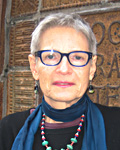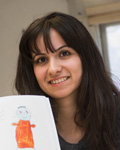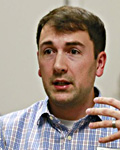Speakers
Sunday, April 23rd beginning at 1:30 PM • Krannert Auditorium, Purdue University
Atina Grossmann
Remapping Survival: Jewish Refugees and Lost Memories of Displacement, Trauma, and Rescue on the Margins of the Holocaust

2017 Rabbi Gedalyah Engel Lecturer
Author and Professor of History, Cooper Union
The lecture addresses a transnational Holocaust story that remarkably – despite several decades of intensive scholarly and public attention to the history and memory of the Shoah – has remained essentially untold, marginalized in both historiography and commemoration. The majority of the c. 250,000 Jews who constituted the “saved remnant” (She’erit Hapleta) of East European Jewry gathered in Allied Displaced Persons camps survived because they had been “deported to life” in the Soviet Union. Moreover, Iran became a central site for Jewish relief efforts as well as a crucial transit stop for the Polish Army in Exile and the “Teheran Children” on their way to Palestine; Jewish refugees, both allied and “enemy alien,” were also a significant presence in British India, in internment camps, orphanages, and the Jewish Relief Association of Bombay. The presentation seeks to integrate these largely unexamined experiences and lost memories of displacement and trauma into our understanding of the Shoah, and to remap the landscape of persecution, survival, relief and rescue during and after World War II. It pays particular attention to the key role of gender, generation, and family in determining the possibilities of survival “behind the lines” on the margins of the European war and genocide, and asks how this “Asiatic” experience shaped definitions (and self-definitions) of “survivors,” in the immediate postwar context of repatriation and further displacement and up to the present globalization of Holocaust and post-colonial memories in a new and evolving context of forced migration and refugee crises.
Biography
Atina Grossmann is Professor of History in the Faculty of Humanities and Social Sciences at the Cooper Union in New York City, where she teaches Modern European history and Gender Studies. She is a graduate of the City College of New York (BA) and Rutgers University (MA, Ph.D). Her book Jews, Germans, and Allies: Close Encounters in Occupied Germany (2007, German, Wallstein 2012)) was awarded the George L. Mosse Prize of the American Historical Association and the Fraenkel Prize in Contemporary History from the Wiener Library, London. She has held fellowships from National Endowment for the Humanities (NEH), German Marshall Fund, Institute for Advanced Study, American Academy in Berlin, and finally Davis Center at Princeton University in spring 2015. She has also held Guest Professorships at the University of Haifa, Friedrich Schiller University in Jena and within 2014-1015 at Humboldt University in Berlin.
Her current research activities focus on “Remapping Survival: Jewish Refugees and Lost Memories of Displacement, Trauma, and Rescue in Soviet Central Asia, Iran, and India,” as well as the entanglements of family memoir and historical scholarship.
Author's Website
Publisher's Website: Jews, Germans, and Allies: Close Encounters in Occupied Germany
Publisher's Website: After the Nazi Racial State
How the Ghosts of the Holocaust Haunted the 1960s, But Quietly
Paper Download: Remapping relief and rescue: Flight, displacement, and international aid for Jewish refugees during World War II (pdf)
Soulaf Abas
Seen for Syria

Artist, Art Educator, Indiana State University
Seen for Syria is an initiative that combines art and gardening to help Syrian refugee children in Jordan cope with trauma. It also connects American children from Terre Haute, IN with Syrian children in the form of art and letter exchange.
Biography
Soulaf Abas was born and raised in Damascus, Syria. She received a Bachelors of Fine Arts from Indiana State University in 2008 and a Masters of Fine Arts in 2013. In the summer of 2012, a year after the revolution began, she returned back to Syria to visit family. Much to her surprise she found what use to be her playground reduced to rubble with bloodstains everywhere. The visit completely changed her perspective and her sense of what home means. Upon return to Indiana, she used her artwork (which mainly focuses on the Syrian crisis) and her teaching skills to raise awareness about what?s happening in Syria. In 2014, she created "Seen for Syria" which is an art education program that allows Syrian refugee children to express their traumas, and an art and letter exchange between under-privileged U.S. children and the displaced, disabled Syrian refugee children.
Artist's Website
Warscapes: Seen For Syria: In conversation with Soulaf Abas and Alyssa Arney
Publisher's Website: Me and You: Letter and Art Exchange between Syrian Refugee Children and American CHildren/i>
Cole Varga
Refugee Resettlement in the Hoosier State

Executive Director of Exodus Refugee
Cole's talk will cover the history, importance, and future of refugee resettlement in Indiana.
Biography
Cole Varga is the Executive Director of Exodus Refugee Immigration Inc. in
Indianapolis, Indiana. He has been with the agency for nearly eight years
and has served in a variety of roles - from starting out as an intern in
the summer of 2009 to his current role as Director, which he assumed in
March 2016. Cole holds a Bachelor's degree from Indiana University where he
double-majored in Psychology and Criminal Justice as well as a Master's
degree in International Relations from the University of Indianapolis.
Previously, he has taught World Regional Geography for 4 years as an
Adjunct Instructor in the History and Political Science Department of the
University of Indianapolis and was an English teacher in Buenos Aires,
Argentina. Cole was recently named to the Indianapolis Business Journal's
Forty Under 40 class of 2017.